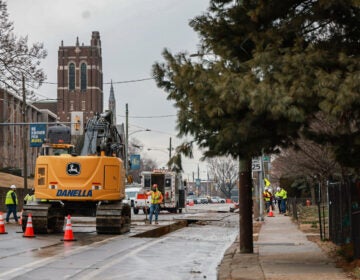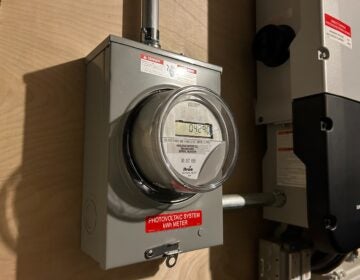PGW customers tell regulators to reject potential rate hike, plan better for climate impacts
Philadelphia Gas Works says inflation has caused it to seek a 13% rate hike. Environmentalists say customers shouldn’t have to pay for the utility’s lack of action on climate.
Listen 1:03
From Right: Emily Abendroth, Climate Justice Coalition and Sierra Club; Juan Peralta, Sierra Club, Ivan Vivar, Physicians for Social Responsibility PA and Climate Justice Coalition. Stood outside the building where the PUC's rate making hearing took place Tuesday in Center City. The Climate Justice Coalition opposes PGW's rate hikes. (Susan Phillips/WHYY News)
This story is part of the WHYY News Climate Desk, bringing you news and solutions for our changing region.
From the Poconos to the Jersey Shore to the mouth of the Delaware Bay, what do you want to know about climate change? What would you like us to cover? Get in touch.
Philadelphia Gas Works customers and environmentalists told the Pennsylvania Public Utility Commission on Tuesday to reject the utility’s proposed rate hikes and order the gas provider to adjust its business model to address its role in the growing climate crisis.
“They don’t want to have to innovate and figure out how to deal with a warming climate,” said PGW customer Peter Furcht, who spoke to WHYY News after testifying at the PUC hearing in Center City. “They just want people to pay more if they don’t sell the gas that they want to sell.”
PGW’s proposed rate hike for fiscal year 2026 would increase the average residential customer’s monthly bills by about $12 a month, from $92.60 to $104.61, according to the PUC.
The utility has also asked the PUC to allow a surcharge on customers’ bills when the winters are warmer than expected, a practice referred to as “weather normalization.” The natural gas provider also credits funds to customers when the winters are colder than expected, causing the use of more gas than anticipated. In 2022, during a particularly warm winter, the move made headlines after customers received shockingly high bills that the utility later refunded after the outcry.
In addition to weather normalization, the utility, for the first time, is seeking permission to apply “revenue normalization,” a potential surcharge to a customer’s bill should the weather normalization charge not be adequate to make up for any unanticipated losses.
Mitch Chanin, an activist involved with several environmental groups — including some that have intervened in the case — testified that the weather normalization and the revenue normalization are an unfair burden, which has an “unintended and perverse consequence for everyone who’s trying to use less gas.”
Chanin said he has installed an air source heat pump to replace natural gas heating in his home to cut climate emissions. But he said his actions to cut his fossil fuel use could cost other PGW customers more money. As the winters warm due to human-caused climate change and more residents electrify their homes or install energy-efficient appliances, PGW will sell less gas. Chanin said the result is that those least able to afford to transition away from natural gas to electric appliances will be left paying the rising gas prices to heat their homes.
“If the PUC approves these adjustments, the weather normalization and the revenue normalization adjustment, it makes regular customers pay for PGW’s [climate] inaction because [the utility] is declining to adjust their investments and their business model to account for the warming climate,” Chanin told WHYY News after the hearing.
In a February release, PGW said it is seeking $523 million in revenue, an increase of $55 million from its 2023 rate case approval of $468 million. PGW did not seek a rate increase in 2024. The utility points to inflation, rising wages, health insurance and increased capital costs.
PGW spokesperson Dan Gross said in an email the utility does “not take lightly adding any dollars to our base rate.”
“We are committed to robust social programs to protect our most vulnerable customers and to doing everything possible to keep our systems operating safely for all Philadelphia residents,” Gross wrote.
The February release pointed to programs to help low-income residents install safety measures, obtain free energy audits and efficiency upgrades, and receive free in-home repairs.
“PGW does not make a profit as a city-owned utility,” PGW President Seth Shapiro said in a statement announcing the rate case in February. “Every dollar collected is directly allocated to ensure the safe and reliable delivery of low-cost energy service to our customers – throughout every ZIP code in Philadelphia.”
Several PGW customers who testified stressed the special significance of the city-owned utility and as such, said it should not pay to lobby against clean energy programs funded by the federal government.
“PGW is my municipal utility,” David Clowney told the PUC. “Along with other citizens of Philadelphia, I own PGW. It shouldn’t be acting as a for-profit company.”
Clowney said he doesn’t see PGW doing enough to help meet the city’s goals of cutting greenhouse gas emissions from buildings or reaching net carbon emissions by 2050.
“[That] would mean PGW becoming an energy company,” Clowney testified, urging the utility to utilize geothermal energy, passive solar and energy efficiency measures. “That is a huge job, and a huge utility could do so much to make it work, but we have seen no such effort from PGW.”
Some who testified also objected to ratepayers footing the bill to expand natural gas infrastructure that they said would become a “stranded asset” as a result of the transition to renewable energy.
Others pointed out that the PGW proposal comes on the heels of a planned rate hike by the water department, SEPTA’s potential 21.5% fare hike, and pending increases in electricity rates.
The proposal also comes amid reports of plans by the Trump administration to eliminate heating assistance to the poor, and cut long-standing federal financial incentives to purchase energy-efficient appliances.
Public testimony before the PUC’s Administrative Law Judge Eranda Vero continues this week, with a decision expected in early September.
This story has been updated with a comment from PGW.

Get daily updates from WHYY News!
WHYY is your source for fact-based, in-depth journalism and information. As a nonprofit organization, we rely on financial support from readers like you. Please give today.






